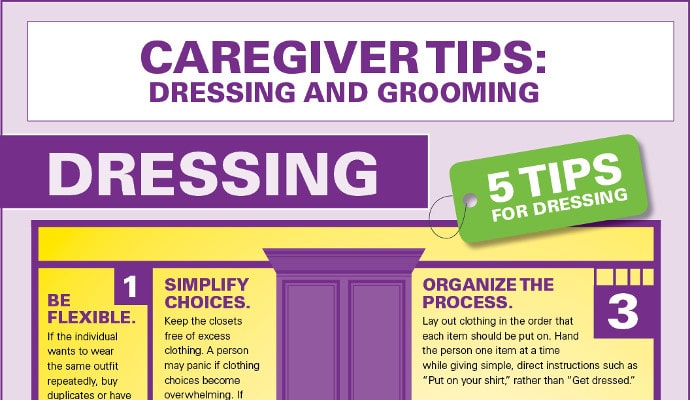Dementia causes problems with short-term memory, and thus, your loved one may repeat the same questions. It’s essential to arm yourself with the proper techniques to change the subject or stop the flow of questions before you get too frustrated by a constant barrage of repetitive questions. In this piece, we provide four tips for responding to repeated questions from someone with Alzheimer's Disease or Dementia.

People with Alzheimer’s Disease or Dementia May Repeat the Same Thing Over and Over
Alzheimer’s disease and other dementias cause problems with short-term memory.
This can lead to repetitive behaviors, such as asking the same question or repeating the same things, which can be a significant source of stress for family caregivers.
Your loved one isn’t doing it on purpose to annoy you. They genuinely aren’t aware they’re repeating themselves the second or twenty-third time.
However, responding to repetitive questions is challenging without eventually snapping or letting frustration show in your voice.
So the next time it starts, do your best to stay calm and use these four tips to respond in ways that help stop the behavior.
(And if you lose your temper, it’s because you’re human. Forgive yourself and take a short break to help you remain patient.)
Why Do People With Dementia Repeat Themselves?
In addition to short-term memory loss, potential causes of repetitive questioning include stress, anxiety, frustration, discomfort, and fear.
A person with Alzheimer’s disease or dementia is often unsure of what’s happening, where they are, or what time or day it is. Those are pretty unsettling feelings.
And if they’re feeling uncomfortable or in pain, they may be unable to express their needs clearly.
So, when your older adult repeats the same thing repeatedly, they’re not necessarily asking because they want an answer.
They may be asking because they’re feeling stressed or anxious and need reassurance, or because they have a physical need.
4 Ways to Respond to Repetitive Questioning in Dementia
1. Respond to the emotions rather than to the words
When an older adult starts repeating something, try to guess which feelings might be causing the behavior.
For example, if you suspect they might be feeling anxious, giving a brief hug or hand squeeze while calmly responding may soothe them enough to stop them from needing to repeat it.
2. Keep your answers brief
It’s tempting to answer a question from a person with Alzheimer's disease with a typical response you’d give to anybody else.
But in this case, keeping your response as short and simple as possible works best.
It saves time and energy and reduces your exasperation when you have to repeat yourself seven more times.
3. Distract with an activity
Sometimes, the only way to get someone with dementia to stop the repetitive questioning is to distract them with something they enjoy.
That could mean offering a snack or a favorite beverage.
Or, you could ask a simple question to get them thinking about something else, like, “The sun is shining today. Isn’t it nice?”
Another idea is to ask them to help you with a simple task they’re still able to do, like folding laundry.
4. Escape for a few minutes
It’s tough to keep calm and not snap at someone when you’ve heard the same thing for the twelfth time.
We’re all human, and everyone’s patience wears thin, especially if this isn’t the first time it’s happened today or has been going on for weeks.
Sometimes you need to leave the room for a few minutes to take a break. Take a calming exercise break, get some fresh air, or listen to your favorite song.
When you come back, you’ll have had a little time to cool off and will be better able to handle your loved one's repetitive behavior with more incredible kindness.
Final Thoughts About Responding to Repetitive Questions
Ultimately, responding to repetition is less about providing the correct answer and more about offering the proper response – one of patience, reassurance, and emotional connection. Your goal isn't to correct their memory, but to calm their anxiety.
By shifting your focus from the factual content of the question to the emotional need behind it, you can transform a moment of frustration into an opportunity for comfort. Remember, your calm presence is your most powerful tool. Be patient with your loved one as they navigate their confusing world, and be incredibly patient with yourself as you master this new language of the heart.
Recommended for you:
- 3 Ways to Respond When Someone with Alzheimer’s Says I Want to Go Home
- How to Talk to Someone with Alzheimer’s: Use Short, Direct Sentences
- Therapeutic Fibbing: Why Experts Recommend Lying to Someone with Dementia
About the Author

Connie is the founder of DailyCaring.com and was a hands-on caregiver for her grandmother for 20 years. (Grandma made it to 101 years old!) She knows how challenging, overwhelming, and all-consuming caring for an older adult can be. She also understands the importance of support, especially in the form of practical solutions, valuable resources, and self-care tips.














Sister always want to know her location because her last home was three hours away, she is in her teens town where she graduated from but her childhood town, is unfortunately the name of her nursing home. How can I help her stop asking where she is. Other residents and staff are tired if it! She can not handle then yelling at her.
That is tough indeed, we hope the suggestions in this article can help you and the care community staff to help your sister feel validated and able to shift to a different topic or activity. This article may also be helpful – “I Want to Go Home” in Alzheimer’s: Try 3 Kind Responses at https://dailycaring.com/when-someone-with-alzheimers-says-i-want-to-go-home-3-ways-to-respond/
well post
I’m glad I found this website and have read similar experiences to mine. At 83 my mother was dropped on my doorstep by my father with 5 bags and completely disowned by him. I can’t forgive him for abandoning her like this but I can see the frustration of what he was dealing with. Its making me feel ill with stress and anxiety as the repetition all day long and having to repeat thing to her hundreds of times is just wearing. I will try some of the exercises you recommend as this is affecting my health. One thing that has made me very angry is that when she went for a dementia test with her GP 2 months ago, I asked to go into the room and witness the test (I have Lasting Power of Attorney). Before this I phoned the doctor to ask that when my mum goes for the test that he treats it delicately by not using the word ‘Dementia’ to her as she doesn’t really want to address this. On the day he refused to let me in to the test so I have no idea of the questions asked, and then afterwards he handed her the test form which had the words ‘Dementia’ all over it. He informed me that she passed the test and had no cognitive deficiency. I later questioned this as she clearly has exactly what you talk about here with endless repetition even asking the same thing 10 times in 10 minutes. He said if I disagree with his diagnosis then she can refer herself to another GP? How crazy is that when she doesn’t think anything is wrong. I then asked if he could send me the results of the test stating that he believes she is OK. The GP sent a letter to my mother which she read and it was a screen print from a computer of the history of this event and stated that I her son had asked that she was not informed that it was a dementia test, and that even after the result I still thought she had dementia.!!! As I say this was addressed to her and she read it !!
We’re so sorry to hear about all that has been happening with your mother and that your father just dropped this responsibility on you. We hope the suggestions in this article will be helpful in reducing the repetition.
In case it’s helpful, we’ve also got more tips on managing other challenging dementia behaviors here – https://dailycaring.com/tag/challenging-dementia-behaviors/
It’s unfortunate that the doctor didn’t handle the situation in a more sensitive way. Perhaps it would be a good idea to get a second opinion and find a different doctor who might show more compassion.
And just in case they haven’t already been ruled out, there are treatable health conditions that could cause dementia-like symptoms. It would be good to rule those out as a cause for this type of behavior.
More info here:
– 7 Treatable Health Conditions with Dementia-Like Symptoms https://dailycaring.com/7-treatable-health-conditions-with-symptoms-similar-to-dementia/
– 8 Treatable Diseases That Mimic Dementia https://dailycaring.com/8-treatable-diseases-that-mimic-dementia/
Dear Steve,
We went through the same thing for years. My sister would leave for work in the middle of the night. Once whe showed up at midnight on Easter night for a doctor’s appointment. She was giving her money away to everyone. She called us every 5 minutes.
Her doctor did the same thing. When my brother told him about it, he told my sister.
Years later, when I just sat in his office and just stared at him, he begrudgingly asked her what was 100 minus 30. She insisted the answer was 30. Finally he took note but it was too late for her to make plans on her own. He has refused to tell her she has dementia. I think he is a “milk-toast” doctor and not around to help their patients when they need it most. We found another doctor who has been treating her dementia-related issues but none of us at this point see the need to tell her. Sometimes she doesn’t recognize us.
My sister is termanally ill. My mother who has dimentia lives with me, 14 hours from my sister and hasnt seen her in almost 2 years. How do we tell her? Or do we tell her at all?
We’re so sorry to hear of your sister’s diagnosis. #1 in this article directly addresses your question – Answer 3 Tough Questions from Seniors with Alzheimer’s https://dailycaring.com/answer-tough-questions-from-seniors-with-alzheimers-expert-advice/
My mother in law is 93 and she has Alzheimer’s/dementia she stays awake for 3 days and nights.. she constantly talks to people who aren’t there..she talks so much until her voice is hoarse..she hallucinates badly..she’s so tired but she will not stop talking..my daughter is her caregiver…Can you please give us some advice on what we should do..Thank you
That sounds like a tough situation for both your daughter and your mother-in-law.
We’ve got some articles that may be helpful in helping her find some relief from these symptoms and dementia behaviors:
— 10 Ways to Respond to Dementia Hallucinations in Seniors https://dailycaring.com/10-ways-to-respond-to-dementia-hallucinations-in-seniors/
— How to Handle Dementia Behaviors Without Antipsychotic Drugs https://dailycaring.com/how-to-handle-dementia-behaviors-without-antipsychotic-drugs/
— Why a Daily Routine Is Important for Seniors: 3 Top Benefits https://dailycaring.com/why-routine-is-important-for-seniors/
— The Positive Effect of Therapy Dolls for Dementia https://dailycaring.com/the-positive-effect-of-therapy-dolls-for-dementia/
— 5 Types of Medications for Alzheimer’s Behavior: Effectiveness, Benefits, and Risks https://dailycaring.com/5-types-of-medications-for-alzheimers-behavior-effectiveness-benefits-and-risks/
My mom passed away 3 years ago, after many years of living with dementia. The repeating was the hardest thing I had to deal with. Most things I could manage, but even though I knew she couldn’t remember asking, it tried my patience on many occasions. I wish there had been somewhere like this when I was going through it. I think it is one of the loneliest and cruelest of diseases, especially for the caretakers. Thank you for what you are doing to help those out there dealing with these problems.
We’re so sorry for your loss 🙁 It’s wonderful that you were able to take such great care of your mom 💜
Of course the old are boring as we do not go to fun places due to a disability . Our friends too are past it, Most of them are in a worse place . If one happens to be more with it theirs none to exchange with ‘ If theirs travelling involved Yes one has been there and done that but again its our memories that are no longer relevant. Our yesterday is at a standstill. One can feel the attention of the other person shutting down as its all been heard before. Yes I know that this is not the reply one wants but Ce la vie
I have tried every thing to get my mom to shower. She has from what I’ve read 6th level alzheimers, and I’ve said, lets shower so we can go shopping, anything to get her in. We have remodeled the bathroom in warm colors, leave towels out she knows, and even te same soap. She is constantly yelling at me and I have the patience of a saint. I do however have my limits. Please any ideas?
I’m so sorry this has been such a challenge. It sounds like you’ve tried many of the things we often recommend.
Another thing you could try is to hire someone to help her bathe. Some people feel more comfortable having a “stranger” help them rather than a family member.
And just in case there are additional ideas you may not have tried yet, check out our article about bathing: 7 Tips to Get Someone with Alzheimer’s to Take a Bath https://dailycaring.com/7-tips-to-get-someone-with-alzheimers-to-take-a-bath/
I’ve experienced this. Think of it as a game and you have to be creative every time they need to shower. Make a daily routine and stick with it. Shower her whatever time of day she is in the best mood, try something that interests her like a new scented soap, bubbles, giving her a task like a sponge and asking her to clean the walls with soap then showering her while she is distracted. I know we want to just say you need a shower so we can go to the store, but sometimes you have to make up a crazy story to get them to do what needs to be done.. unfortunately, they dont remember the things we tell them, but it will help you both be less stressed.
hello
dad’s the same way; he asks the same questions i.e. where’s my (late) mother over and over and over again, driving me nuts!! i keep on telling him that she’ll be back shortly but ignores me and repeats it. at least thrice he became violent and threatened to hit me as my reply wasn’t to his liking and late last night he did exactly that. i really am tempted to take him to an old folks home as all the meds and or sedatives he took didn’t do him any good; in fact his situation worsened and his mania increased.
any suggestions??
You may need to experiment with different creative responses since telling him that she will be back soon doesn’t seem to be working as well as you’d like. Hopefully, trying to redirect his attention to a pleasant activity or increasing the amount of enjoyable activities in his daily routine will help take his mind off of this thought and reduce his fixation and need to repeat the question.
These articles may also help you find ways to reduce this behavior:
— 6 Things to Try Before Using Antipsychotic Medications for Dementia Behaviors https://dailycaring.com/6-things-to-try-before-using-antipsychotic-medications-for-dementia-behaviors/
— Challenging Alzheimer’s Behaviors Solved with Expert Communication Tips [Video] https://dailycaring.com/video-difficult-alzheimers-behaviors-solved-with-expert-communication-tips/
— 10 Affordable Products for People with Dementia That Increase Comfort and Calm https://dailycaring.com/10-affordable-products-for-people-with-dementia-that-increase-comfort-and-calm/
It’s also possible that a medication review is necessary. Certain medications like sedatives or antipsychotics can worsen behavioral symptoms in people with dementia. More info here — 5 Types of Medications for Alzheimer’s Behavior: Effectiveness, Benefits, and Risks https://dailycaring.com/5-types-of-medications-for-alzheimers-behavior-effectiveness-benefits-and-risks/
Safety is number one. If you’re afraid for your physical safety, please get help right away to protect both of you. We’ve also got two articles with suggestions about reducing and managing aggressive behavior:
— 14 Ways of Dealing with Aggressive Behavior in Dementia https://dailycaring.com/14-ways-of-dealing-with-aggressive-behavior-in-dementia/
— 7 Ways to Reduce and Prepare for Aggressive Dementia Behaviors https://dailycaring.com/7-ways-to-reduce-and-prepare-for-aggressive-dementia-behaviors/
The best way to deal with this is to tell him she went shopping or she is away for two days, she had some things to do. Its important that your dad feels like he is in control . so the more you reassure him the better off he will be, tell him she is away and then maybe suggest listening to some music or maybe do a puzzle with him or watch a movie or read a short story to him? I hope this helps. I work in a 25 bed secure dementia unit and I understand the difficulty, but they really are not in control of their emotions or minds. I just did a Tai Chi for memory loss and Tai Chi for heart conditions instructors course , so Maybe try and get your dad involved in something like that it is amazing! I am going to start doing it with my residents next week..
Excellent suggestions, thank you for sharing!!